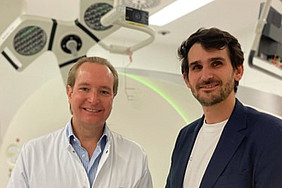LMU University Hospital Munich selects Munich-based start-up deepc as AI platform partner to support radiological diagnostics. 'deepcOS' is designed to simplify medical workflows and enable better treatment quality for patients.
The use of artificial intelligence (AI) is on the rise in medicine and is intended to support doctors in diagnosis, for example.
The LMU Munich Hospital is also working on AI solutions for clinical practice and research in order to continuously improve clinical workflows and patient care. With its two locations, the hospital is one of the largest university hospitals in Europe and treats more than 500,000 patients annually. The radiology department at LMU Hospital focuses on personalization and optimization of diagnosis-guided therapy. The central pillar here is the use of artificial intelligence in daily practice.
AI platform deepcOS aims to optimize patient treatment
Now, the radiology department of Munich's LMU Hospital is working closely with Munich-based medtech company deepc to systematically apply AI in clinical practice on a larger scale. Through the innovative AI platform deepcOS, radiologists will have easier access to numerous world-leading and regulatory-approved AI solutions. Medical workflows are thus to be made more efficient and the quality of patient treatment further enhanced.
The necessary data protection is also a top priority: the pseudonymization of the patient's diagnostic data takes place on-site (on-premise), the processing of the data on secure cloud servers and the re-identification again on-premise.
One has already gained clinical experience with AI in reporting for orthopedics and in scientific collaborations in the areas of brain MRI and thorax CT, according to Prof. Jens Ricke, director of the Department of Radiology at LMU Munich Hospital. They also want to develop their own AI prototypes, he said. With deepc's AI platform, they are now positioning themselves more broadly in clinical routine. Ricke expects this to lead to even more accurate and faster diagnostics and to make work easier for his team.
Boj-Friedrich Hoppe, radiologist and head of the Digital Agenda Group at LMU University Hospital, is also convinced that using deepcOS is the right solution. "Instead of integrating individual AI solutions in a resource-intensive and one-off way, we have uncomplicated access to many AI solutions via a single gate and with uniform technical and legal frameworks." He added that a particular advantage in the partnership with deepc is that the start-up independently selects which AI solutions should process the image data.
Co-founder and CEO of deepc, Dr. Franz Pfister, is proud that a renowned institution such as the LMU University Hospital relies on the deepcOS platform, which he says can support radiologists in their everyday clinical work.
Prof. Clemens Cyran, deputy chair of the Department of Radiology, thinks even further. He wants his colleagues to be alerted in real time to critical emergency findings - detected by the AI. This should support timely patient care. He also wants to focus on the deep integration of various solutions into existing clinical workflows. This includes the automatic transfer of results into report texts or the integration with the Picture Archiving and Communication System (PACS) and Radiology Information Systems (RIS) in the context of worklist prioritization.

